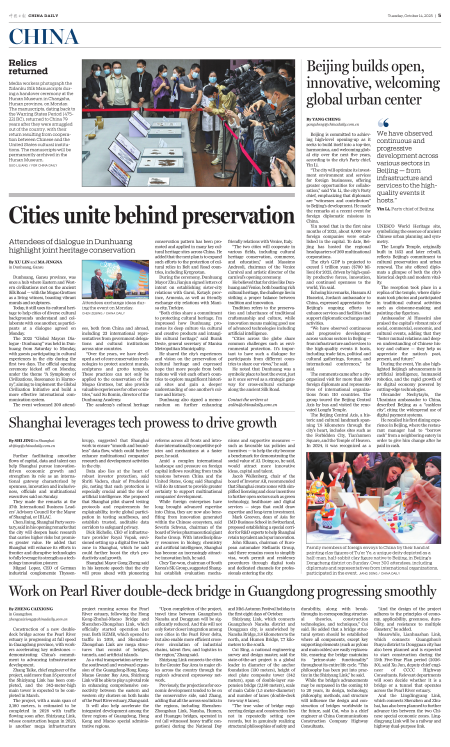Further facilitating smoother flows of capital, data and talent can help Shanghai pursue innovation-driven economic growth and strengthen its role as an international gateway characterized by openness, innovation and inclusiveness, officials and multinational executives said on Sunday.
They made the remarks at the 37th International Business Leaders' Advisory Council for the Mayor of Shanghai, or IBLAC.
Chen Jining, Shanghai Party secretary, said in his opening remarks that the city will deepen basic research that carries higher risks but promises greater value. He added that Shanghai will enhance its efforts in frontier and disruptive technologies to fully leverage its strength as a technology innovation pioneer.
Miguel Lopez, CEO of German industrial conglomerate Thyssenkrupp, suggested that Shanghai work to ensure "smooth and boundless" data flow, which could further enhance multinational companies' research and development activities in the city.
Data also lies at the heart of robust investor protection, said Shriti Vadera, chair of Prudential plc, noting that such protection is especially crucial amid the rise of artificial intelligence. She proposed that Shanghai pilot shared testing protocols and requirements for explainability, invite global participation in testing sandboxes, and establish trusted, auditable data corridors to safeguard privacy.
Dick Richelle, CEO of infrastructure provider Royal Vopak, envisioned setting up a digital free trade zone in Shanghai, which he said could further boost the city's productivity and growth.
Shanghai Mayor Gong Zheng said in his keynote speech that the city will press ahead with pioneering reforms across all fronts and introduce internationally competitive policies and mechanisms at a faster pace, he said.
Amid a complex international landscape and pressure on foreign capital inflows resulting from trade tensions between China and the United States, Gong said Shanghai will do its utmost to provide greater certainty to support multinational companies' development.
While foreign enterprises have long brought advanced expertise into China, they are now also benefiting from innovation generated within the Chinese ecosystem, said Severin Schwan, chairman of the board of Swiss pharmaceutical giant Roche Group. With interdisciplinary resources in biology, chemistry and artificial intelligence, Shanghai has become an increasingly attractive innovation hub, he said.
Chey Tae-won, chairman of South Korea's SK Group, suggested Shanghai establish evaluation mechanisms and supportive measures — such as favorable tax policies and incentives — to help the city become a benchmark for demonstrating the social value of AI. Doing so, he said, would attract more innovative ideas, capital and talent.
Jacob Wallenberg, chair of the board of Investor AB, recommended that Shanghai create zones with simplified licensing and clear incentives to further open sectors such as green technology, healthcare and digital services — steps that could draw expertise and long-term investment.
Mark Greeven, dean of Asia for IMD Business School in Switzerland, proposed establishing a special corridor for R&D experts to help Shanghai retain top talent and spur innovation.
John Elkann, chairman of European automaker Stellantis Group, said there remains room to simplify visa, work permit and residency procedures through digital tools and dedicated channels for professionals entering the city.
shijing@chinadaily.com.cn

